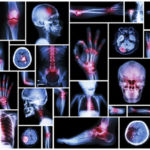I want to be okay. Some days I am. But some days, it feels like my words slosh about disjointed. My eyelids are heavy shades that won’t stay open. Pain suffuses every joint in my body, and the throbbing in my head makes it impossible to tolerate light or noise. Day-to-day is unpredictable, sometimes moment to moment. On days I feel good, I navigate the world without thinking about each literal step, although I still need to be mindful I don’t overdo activities or else I will fall right back into the flare pit.
While there is a growing awareness that not all disabilities are alike, there is still a tremendous bias toward visible and static disabilities. Brianne Benness, the host of No End In Sight, a podcast about life with chronic illness, explains the differences succinctly:
“In mainstream culture and media, ‘disabled’ usually refers to people with static and visible disabilities. And when institutions and organizations talk about building a more inclusive environment, they’re usually talking about providing static accommodations like ramps and closed captions.”
But what happens if I need those ramps today but not tomorrow?
I have a mostly invisible disability called Hypermobile Ehlers-Danlos syndrome (hEDS), a collagen defect that puts me at risk for injury because my joints are too flexible. Most diseases don’t act in isolation, and neither does EDS, so when I’m sick, I always experience a host of comorbid symptoms more acutely, like heart palpitations, nerve pain, rashes, and feeling faint upon standing, just to name a few.
When I got the flu in my sophomore year of college, I subsequently dislocated my shoulder, which led to months of pain, fatigue, and missed school. Later that same injury caused my jaw to dislocate and ultimately led to an unstable neck requiring spinal fusion surgery.
“You don’t look sick,” some teachers and friends would say. I’d put on a brave face and mustered through, often paying for it when (unseen by others) I’d need to stay in bed the following day, utterly exhausted. “When I see you, you are always smiling. I would never know that you are in constant pain,” a kind professor said when I informed him of my upcoming surgery. On most days, people couldn’t see I have a disability as for the most part I wasn’t a wheelchair user and didn’t wear a brace. At some point, I ended up needing to wear a neck brace all the time, and during those months, I suddenly became more visible to others. Friends and teachers readily acknowledged me. One day I walked into a coffee shop feeling quite well, but the barista took one look at my neck brace and insisted that my coffee was on the house.
People with an invisible disability have yet another hurdle to jump—they aren’t believed. The common static thinking seems to be that if you need a wheelchair some days, you should use one every day. There is an unsaid (sometimes said) statement that you are getting accommodations you don’t deserve.
I refuse to let my disability get in the way of achieving my dreams. So why would a counselor in the Office of Disabilities tell me, “accept the fact that you need a wheelchair, and if you are so fatigued, maybe you should drop out?”
I didn’t! I got a full merit scholarship and maintained a perfect GPA despite missing out on months of school. After undergoing a spinal fusion surgery last year, I had an epiphany that nursing was the ultimate career where I could make a difference. I was so transformed by my hospital experience that as soon as I was able to sit up, I made a life-altering decision. I applied, transferred, and got into a highly-rated nursing program.
Perhaps I am naive, but wouldn’t you expect a nursing school to be sensitive to all abilities? Apparently not. Sadly medical and nursing professions are notoriously ableist communities. Ableism is “the discrimination and social prejudice against people with disabilities based on the belief that typical abilities are superior.”
“You can’t keep using your accommodations as an excuse for everything,” I was told by the assistant dean of the nursing school. A friend of mine who has EDS was told she couldn’t do clinicals while wearing a nasogastric tube she needs to relieve her persistent GI issues. All I want is a fair chance to complete my work. “It wouldn’t be fair to the other students,” a professor told me. But what’s fair about having Covid, followed by a flare-up of EDS symptoms, and losing my beloved grandmother all in the same week? “If you don’t get to the Office of Disabilities to take my exam within two hours, you will fail my class,” was the professor’s unsympathetic verdict.
While the Office of Disabilities is set up to intervene and inform faculty on my behalf, their response was, “The professor has full discretion to determine whether you can take this missed exam.” Does this response mesh with their stated “commitment to providing equal educational opportunities and participation for all students?”
There is a policy in nursing clinical rotations—’no drinking or sitting while you are on the hospital floor.’ If staying hydrated and sitting will let me function at my best and doesn’t compromise patient care in any way, wouldn’t it seem obvious that a healthcare institution would make an exception? I would surmise that my patients, more than anyone, would understand; knowing their caregiver is someone who truly understands what it feels like to be on the other side could only be an asset.
The Disabilities Office touts that “accommodations and other related services are determined on a case-by-case basis, taking into consideration each student’s disability-related needs.” So why are they putting more obstacles in my way? I am forced to use my accommodations all of the time, even though I put them in place for when I am in a flare and truly need them. ‘No drinking is allowed during exams,’ is another standard policy. Their ‘one size fits all’ accommodations end up being counterproductive. For a nursing exam, I must show up to a designated alternate space from my peers and take an exam an hour earlier than scheduled. It may seem a minor point, but I’ve been struggling with adrenaline surges at night and heart palpitations that affect my sleep, and the earlier time is actually causing more harm than good to my body. “Use it or lose it” is their policy. In their eyes, disability is static, and I’m left with no choice but to comply or risk losing my accommodations for the future. I’ve been told, “You can’t pick and choose when you use your accommodations.”
I am constantly walking a tightrope —how long will this good feeling last? What can I do without overdoing it? The institution remains inflexible, will not listen, and, least of all, is not accommodating.
When my cousin was in medical school, she had accommodation for a vision disability (undetected by looking at her). The professor was hesitant to honor the accommodation for additional time on an exam. “If I give you more time, it’s not truly a timed exam. It wouldn’t be fair to others.” Her assertive response makes the point clear. “What I am asking for is simply to even out the playing field. I am just asking for a chance.”
We hear a lot in the news about the lofty goals of diversifying your workplace in general and in the healthcare field in particular. Perhaps it’s the definition that needs closer examination to include disabilities, both visible and invisible? Right now, more often than not, that translates to a reality of “if I can’t see your disability, I don’t believe you. And if you have varying (dynamic) invisible disabilities, not only don’t I believe you, but I think you are out to take advantage of the system.”
Whether your disability is evidently visible or not, you deserve to be believed and respected. Please trust that if I’m asking for help via an accommodation, I truly need it. And if I need it today but not tomorrow, please trust me that I respect you in return.
Every day for us is a constant dance of being flexible and pivoting directions just to make it through each day. Couldn’t you stop, listen and put yourself in our shoes, just for a moment? Isn’t that what healthcare is supposed to be all about? Isn’t an Office of Disabilities’ mission meant to protect those needing the playing field evened up so we, too, have a chance to contribute to society in the most meaningful ways?
Guest Post by Avi Zahavi; Image by Avigail Schimmel
(Avi wrote this piece on behalf of her daughter, who gave full consent.)
March 2023



